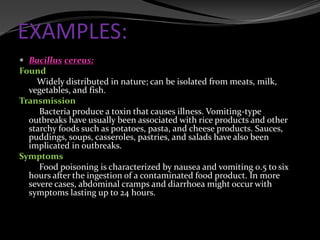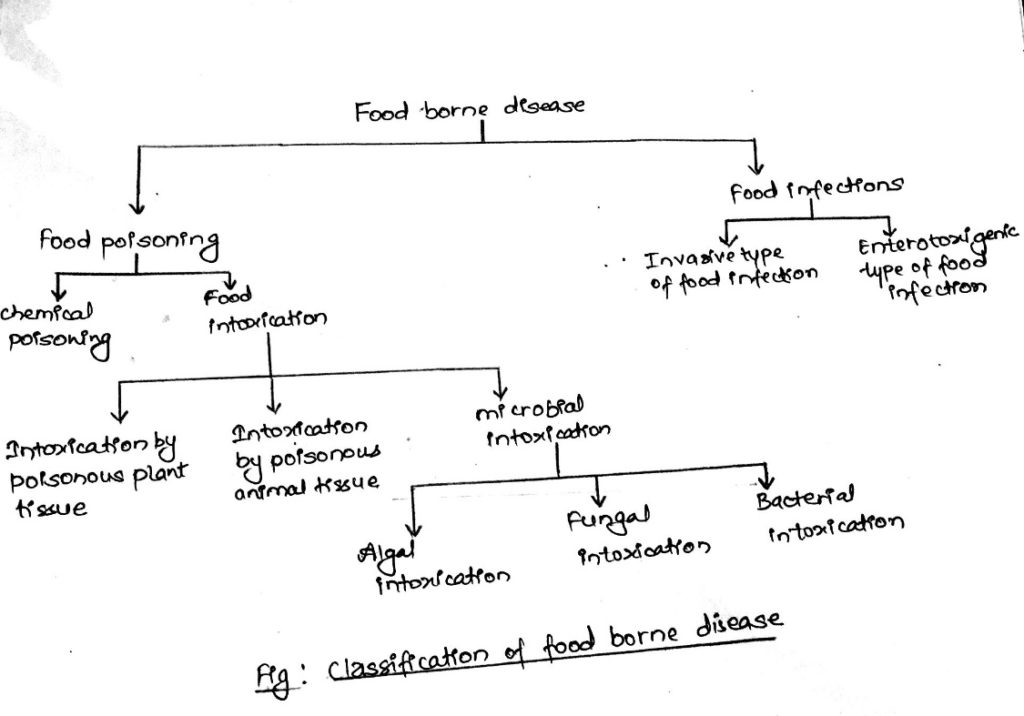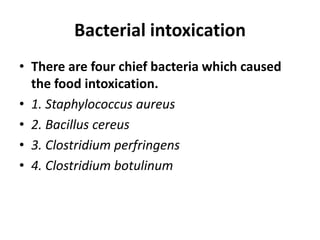Which of the Following Is an Example of Food Intoxication
Clostridium botulinum poisoning is one of the most common examples of food intoxication where C. Botulinum is ingested live along with food and the microbe produces toxins in.

Food Borne Infection And Intoxication
TCO 1-6 Which of the following is TRUE concerning the safe storage of leftovers.

. Foods that are not cooked after handling such as sliced meats puddings pastries and sandwiches Vibrio Symptoms begin 2 to 48 hours after exposure. Coli Salmonella and Campylobacter to name a few common onesAn example of food intoxication is mostly viruses such as. The specific organism The disease and its symptoms Patient outcome if left.
Answer Clinical Application Questions 1-3 for Chapter 15 on page 450. Avoiding a meal caused you to have food poisoning the past Experiencing nostalgia when visiting a previous not studying for an test because of many previous failed attempts rewarding a dog for good behavior with a treat. For a foodborne illness poisoning to occur the following conditions must be present.
Which of the following is an example of food intoxication. An example of food intoxication is Clostridium botulinum poisoning. A Eighty-two people who ate shrimp in Louisiana developed diarrhea nausea headache and fever from 4 hours to 2 days after eating.
Food intoxication is a form of food-borne illness caused by ingesting exotoxins made by organisms such as bacteria. B Two people in Vermont who ate barracuda caught in florida developed malaise nausea blurred vision breathing difficulty and numbness 3 to 6 hours after eating. Provide at least three.
Fermented carbohydrates protein rich foods canned fish products pulses and cereals are. Foodborne intoxication is caused by ingesting food containing toxins formed by bacteria which resulted from the bacterial growth in the food item. Which of the following is an example of food intoxication.
Addition of alkaline and acidic agents to foods b. Illness produced from ingestion of food contaminated with natural toxins e. Toxins can be present even when the bacteria or other causative organisms are not and it is possible to develop food intoxication by.
What are the differences between food intoxication and food infection. The microorganism or its toxin must be present in food. Using the Internet research about food intoxication and infection.
Foodborne intoxication is more commonly referred to as food poisoning. TCO 1-6 The primary symptom of Giardia infection is. Answers should be submitted in a word.
Depending on the source of the. Explain this distinction in detail. B it is caused by a toxin compound rather than by inaction of pathogenic bacteria 18.
Occurs when live bacterial cells are ingested which then produce toxins in the body. Explain this distinction in detail. TCO 1-6 Which of the following is an example of food intoxication.
Using the Internet research about food intoxication and infection. Each example should include. An example of food intoxification is Clostridium perfringens.
Oysters can contain saxotoxin which causes paralytic shellfish poisoning. Addition of alcohol-containing beverages in the cooking of foods d. Occurs from eating a food that contains a toxin produced by bacteria.
We review their content and use your feedback to keep the quality high. Its caused when foods that contain toxins from pathogens are eaten. A salmonellosis b botulism c listeriosis d cholera.
Watery diarrhea nausea stomach cramps vomiting fever chills. The live microorganism does not have to be consumed. Based on your research respond to the following.
The food borne illnesses due to above mentioned microbes are staphylococcal intoxication botulism and mycotoxicosis respectively. Which of the following is not an example of classical conditioning. Coli Salmonella and Campylobacter to name a few common onesAn example of food intoxication is mostly viruses such as.
What is the probable etiological agent in each case. This type of illness is caused by botulinum toxins not the bacteria that produce it as is the case with any foodborne intoxication. An example of food infection includes bacterial infections such as E.
Explain whether each of the following examples is a food infection or intoxication. Experts are tested by Chegg as specialists in their subject area. Psychology questions and answers.
AAddition of alkaline and acidic agents to foods BIllness produced by acute overconsumption of high-fat foods CAddition of alcohol-containing beverages in the cooking of foods DIllness produced from ingestion of food contaminated with natural toxins. TCO 5 Which type of dietary fat is known to elevate blood cholesterol levels. Which of the following is an example of food intoxication.
An example of food infection includes bacterial infections such as E. Which of the following is an example of food intoxication. Illness produced by acute overconsumption of high-fat foods c.
Clostridium botulinum is an example of. Based on your research respond to the following. D Illness produced from ingestion of food contaminated with natural toxins 17 Which of the following is a characteristic of botulism illness.
Botulism would be an example of food borne intoxication. Who are the experts. What are the differences between food intoxication and food infection.
Provide at least three specific examples of each.

Food Safety Ppt Video Online Download

Food Borne Disease Food Poisoning And Food Infection With Example Online Biology Notes

Comments
Post a Comment